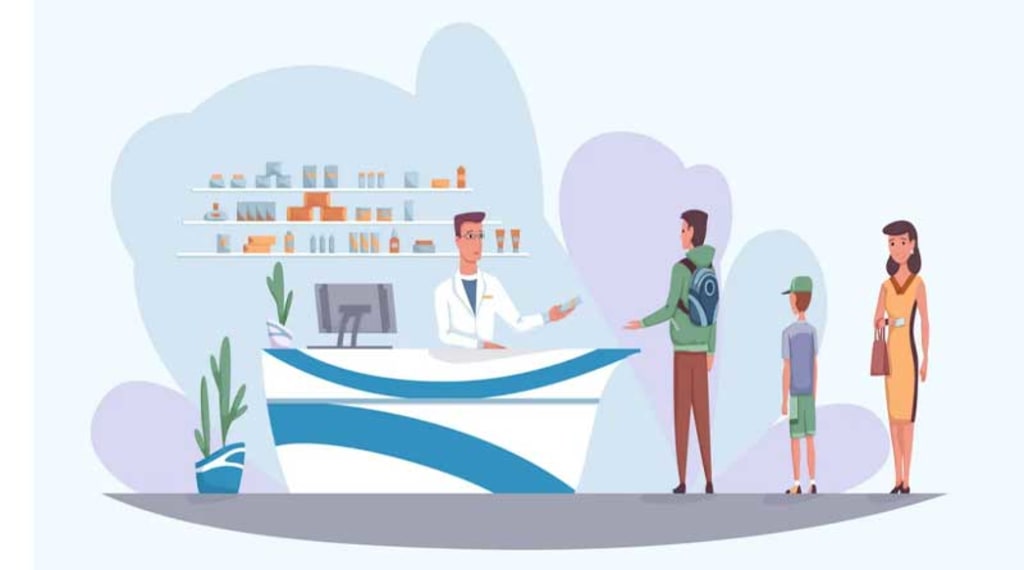Top Healthcare IT Trends in 2022-2025: Important to Know for Successful Pharma Businesses
IT Trends in Pharma Business

In line with the lessons of the past years, the healthcare industry shows an openness to new developments and technological advancements in many issues.
However, there are various innovations available for healthcare professionals that healthcare providers are adopting. This type has started its journey to incorporate the latest trends in digital healthcare transformation.
Tomorrow is right near, and the ideal time to make an investment in the future of healthcare is right now. To help you understand the current situation, we outline the most exciting forecasts and the leading technologies.
Trends in IT for 2022-2025 are worthy of consideration and implemented by 2021 in this article.
Future of Healthcare: Statistics
According to the 2022 Hospital Vision Study,
- We'll witness the increase in the usage of smartphones (from 51 percent from 2017 to 98% by 2022 for physicians
- It is between 42% and 96% for pharmacists)
- And the rise of technologically-savvy healthcare patients (with seventy-seven percent of those surveyed believing that clinicians are making use of mobile devices for their treatment).
- In this regard, the move towards building mobile-friendly, competent healthcare is a must for both medical professionals and patients.
The list of potential consequences is far more extensive. It involves streamlining hospital operations and relying on the potential of data, the power of consumerization of the sector, modernizing infrastructure, improving healthcare, and a myriad of other aspects. These are the foundations for the future of healthcare in 2022.
In general, the life sciences are geared up for the exciting possibilities that digital health trends have brought about since 2017. Certain technologies are being well-known, and healthcare professionals are fighting to be noticed. For the second type of technology, specific tools and enhancements are in a solid position to influence healthcare's near future.
Six Predictions for Healthcare Trends 2022
Digital Transformation is the central concept behind all healthcare IT emerging trends. In hospitals that adopt digitally-friendly culture management, the top executives are aware of the value of investing in new technologies and choose to train medical personnel the necessary abilities to utilize them to their best advantage.
In this respect, Delimited announced six central forecasts for the upcoming health-related trends:
- The people who are educated regarding their health. The standard personal profile is no longer a secret for anyone, and people can take an active approach to enhance their overall health. Many self-checking devices and apps allow for this.
- The shift towards intelligent healthcare. The increased awareness of patients coupled with technological advances will transform the whole healthcare system. These changes in healthcare will include the creation of affordable technologies for patients that are available to many patients.
- Healthcare is a productivity-focused industry. Lean operating models lead to easier fundraising and the introduction of cost-effective tools. Hospitals can deploy sophisticated instruments (like AI and ML) and boost productivity by scaling up with better compliance and reliability based on the current technological framework.
- Data as a healthcare currency. The advancement of precision medicine and more accurate forecasts of patients' behavior and responses are now possible thanks to AI and evidence from real-life healthcare professionals. Soon, AI will be able to determine the available diagnosis and treatment, ensuring the absence of human errors.
- Rapid advancements in life-expanding and precise treatments. The trends in healthcare will result in P4 Medicine (as fully predictive and preventative, as well as personalized and participatory) that will revolutionize healthcare. Innovative biotechnology forms the foundation for a genomic-driven medical treatment that is expanding our knowledge of treatment options.
- The blurred lines between the various stakeholders. The healthcare industry will undergo significant changes because of the increasing influence of non-traditional health care and the growing self-awareness for patients. In the process, we'll observe the shift to a customer-focused service delivered via creating new alliances and partnerships.
9 Essential Tech trends in healthcare for 2022-2025
According to the projections previously mentioned, the most promising health care developments in the next few years could contribute to the development of high-tech and patient-centered service delivery requirements for the future.
We've selected the nine most efficient trends in virtual healthcare to accomplish these objectives:
- Telehealth
- Artificial Intelligence (AI)
- Medical chatbots
- Mobile apps
- Electronic data management
- Blockchain
- Cloud computing
- Digital supply chains
- Hyper-personalized medicine
Continue reading to find more information on these health trends!
Telehealth
Telehealth technology has already received regular approval and support from clinicians. In the COVID-19 lockdown, virtual communication was required in the past, but it's poised to become the standard.
In the main, Telehealth technologies unite numerous platforms of software that can support video conferencing. Voice calls, secure messaging, as well as extensive notification systems. With the help of online portals, patients can maintain constant communication and have the required number of interactions with healthcare professionals.
Shortly, these visits will be augmented with all the required elements, including diagnostic tools, performing physical examinations, and supplying specific treatment plans. This is all without the typical annoyances of traveling to the hospital and waiting in line.
Artificial Intelligence (AI)
By implementing Robotic Process Automation (RPA), AI establishes an intelligent healthcare system that addresses many issues. The most common areas for AI applications are the coordination of activities and workflow optimization, physicians managing their time, and the use of paperless documents.
Additionally, the advancement improves the collaboration between departments, which helps medical professionals, data science, and bio-scientists provide patient-centric efficient, precise, and ingenious services.
As a crucial improvement for healthcare institutions, AI algorithms improve the quality and efficiency of the delivery of diagnosis for diseases by collecting medical records, analyzing the results of diagnostic tests, and enhancing the function of radiologists.
In this manner, the technology allows for the analysis and action of vast amounts of information that human brains cannot fully comprehend.
The most current applications of AI health trends are:
- AI-assisted robotics, which is where robots review the medical records of patients to assist surgeons under challenging surgeries
- AI-powered virtual assistants that communicate with patients on physicians' behalf.
- Automating the clinical management and workflow
- Medical diagnosis software
- Identification of a participant in a clinical trial
- A speedier development and discovery of drugs in the pharma industry
- Apps for preventing dosage errors
- Brain-computer interfaces that use AI to treat brain-related impairments
Medical Chatbots
In AI-powered technology, a medical chatbot is an online tool that can solve particular industry-specific problems, automatize healthcare processes and boost overall efficiency.
Chatbots, in particular, collect, digitize and secure the patient's data, help replenish or monitor patients, provide assistance with requests for information or appointments, and offer medical services.
Because of its extensive features, low cost, and low development cost, medical chatbot technology is set to become a must-have technology quicker than other healthcare trends discussed here.
The primary characteristics of a highly effective medical chatbot include:
- Anonymity, which means safety and security of patient's data sharing
- Monitor tools for easy-to-use and templates
- High-end personalization, making use of information based on physical indicators as well as patient behavior.
- Real-time interaction
- Scalability
Healthcare professionals can profit from this technology, which has a reduced response time, the capability to manage an unsuitable number of users, provide precise medical advice, and a more straightforward scheduling process with automated reminders and valuable templates.
Mobile Apps
The development of mobile apps can bring many advantages to hospitals, such as increasing customer loyalty, increasing the accuracy of patient information, and enhancing the process of managing compliance.
A customized mobile application solution can manage various patient-related processes, exceptionally personalized patient care, and remote monitoring when requested from a trusted supplier.
In addition, mobile apps are among the top innovations in healthcare that improve accessibility to medical care on a vast scale. Since the entire hospital is accessible on smartphones, even those in remote regions can receive the required assistance quickly.
Healthcare professionals who need the development of mobile apps should confirm the inclusion of these features in their solutions:
- Secure electronic patient data
- A categorized list of diagnostics
- Treatment protocol templates
- In-app notifications that send messages to the patients
- The ability to process payments via safe payment getaway
- Online support
- HD videoconferencing compliant with HIPAA
- Scheduling appointments
- Integration with wearables
Electronic Data Management
Generally speaking, incorporating new technologies in healthcare lets medical professionals significantly increase the quality of their treatment and overall efficiency.
A central database working in conjunction with Big Data, it's also simpler to keep track of and manage the patient's information. Many hospitals have already seen the benefits of electronic medical records, and they also enhance the efficiency of collecting electronic data.
Newer and more efficient tools for collecting information about patients are available. For instance, natural processing of language (NLP) allows automatic writing possible. This allows for more efficient structuring of data and easier repurposing of the existing narratives to aid in diagnosis and treatments.
Integrating the hospital's internal database with data from third parties from reports, wearables, and reliable sources opens up the potential to build highly detailed and customized physician and patient profiles. In this way, technology improves transparency and confidence in health professionals and the general patient population.
All in all, health information helps boost clinical and financial performance and is a crucial element in predictive analysis, live support for clinical in precision medicine, and the proactive approach to treatment.
In the future, doctors who are data scientists are inevitable as professionals who are digitally savvy and have multidisciplinary experience will help enable the transformation to innovation quicker and more effectively; they must teach physicians to utilize analytics so that investment in electronic records can bring the most significant value.
Blockchain
To ensure the success of the digital transformation, security is the top priority. As one of the leading trends in healthcare, the blockchain can help secure connections between data and the general security of electronic data. Mainly, it protects the patient's data, ensuring safe and reliable data sharing within healthcare institutions.
Numerous industries and government agencies are currently working on the introduction of efficient regulations, as well as different "data lakes", which are essential to ensure the safety of the ecosystem.
Blockchain also affects healthcare costs by effectively handling a massive volume of duplicated information, resulting in additional storage costs. In this respect, intelligent contracts assist in reducing inconsistencies between hospital regulations and regulations of the government. Since they are self-executable, they can automate the procedure without management or control.
Healthcare providers can use our suggestion for blockchain implementation is to go with the BaaS model and bring in several partners, which could include traditional healthcare providers in the creation of the network.
Cloud Computing
Moving data to the cloud is one of the most prominent developments in healthcare and other sectors. To ensure the future of healthcare, cloud computing is an excellent solution to optimizing data management to reduce costs.
Additionally, it aids in the creation of a self-sufficient healthcare ecosystem.
List of advantages cloud computing offers hospitals includes:
- ability to derive intelligent insights from information
- Tools for risk mitigation
- The ability to access the most expansive perspective that is possible
- Big Data analytics
- Higher accuracy in treatment and decision-making
- More flexibility is responding to the needs of the industry
- Health information is transparent
- Cost-effectiveness
The companies can communicate with regulators and monitor their crucial processes using cloud-based systems in a larger sense.
This creates the foundation for intelligent health communities and digital supply chains that are among the most anticipated technologies for healthcare IT in 2022-2025.
Digital Supply Chains
Digital transformation is expected to accelerate by 2022, which means that technology will enable different operations and entire supply chains.
In this context, the increasing popularity of software for managing supply chains and cognitive automation software is astonishing. These trends in healthcare can handle massive amounts of data, provide actionable suggestions, and connect all of the activities such as devices, software, and types in or around the facility on one digital platform.
Shortly, hospitals will be able to automatize various routine processes and utilize advanced analytics to perform market research, predict demand, and increase the efficiency and consistency of their offerings.
For healthcare professionals, the trend can be beneficial in productivity improvement and optimization of decision-making. Cognitive automation platforms provide a seamless and accessible experience for all key managers to achieve these outcomes.
They offer transparent, data-driven reasoning that can adapt to changes in the external and internal environment, have a human-like level of intelligence, and are built to be adaptable.
So digital supply chains in healthcare can be able to achieve complete agility and improve decision-making accuracy.
Hyper-Personalized Medicine
One of the more exciting health trends, hyper-personalized medicine, can treat diseases that are generally referred to by the term "helpless." It is a collection of digital tools that can treat genetic disorders inherited by creating innovative medicines.
The treatment is customized to individuals' genetics and provides the needed changes to their body structure. The possibility of hyper-personalized medical treatment is recognized by authorities from the U.S. government, as they anticipate receiving $3.18 trillion by 2025.
The ability to treat rare illnesses is a clear benefit for doctors, and it is a revolutionary method for patients who suffer from rare diseases today. The time is now for hyper-personalized medicine to become more affordable and common.
Conclusion
How can a Pharma solution help you implement any Healthcare Technology?
Pharma solution is the top software development company that brings together engineers with years of experience delivering digital solutions to medical requirements.
It can help healthcare providers by providing automation tools to increase efficiency in operations and improve the products they already have and modernize the whole infrastructure at a substantial expense.
Here's the complete list of our IT solutions for healthcare and services that you can request now:
- Hospital information systems
- Data engines
- Internet of Medical Things
- Remote medical treatment
- Health awareness
- Electronic health record
- Pharma billing software
For more information and customized software for Pharma Industry, please contact us directly. Let's make a difference in our future in healthcare with us!
About the Creator
Akanksha Bhargava
Akanksha Bhargava likes to read & develop innovative content on upcoming trends based on the retail/wholesale business segment. With her write-up, she offers businesses an idea to update their work. She actively helps businesses stay awar






Comments
There are no comments for this story
Be the first to respond and start the conversation.